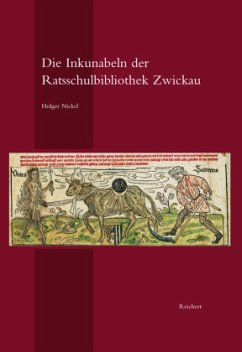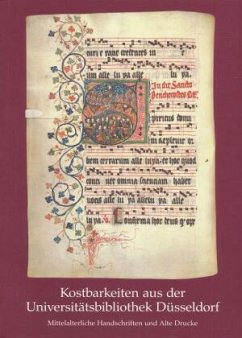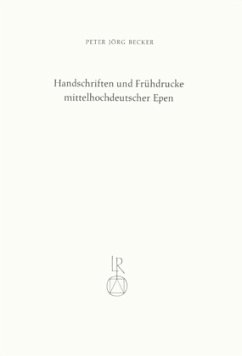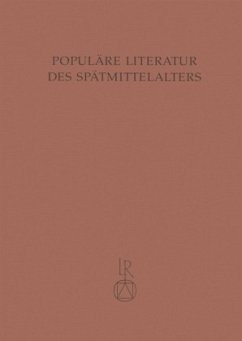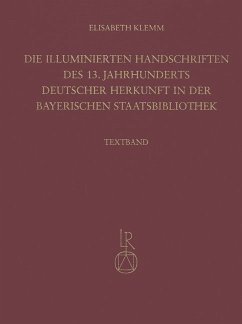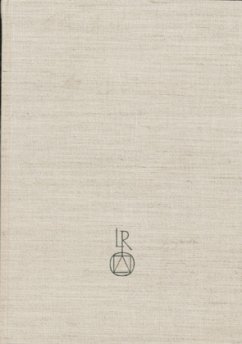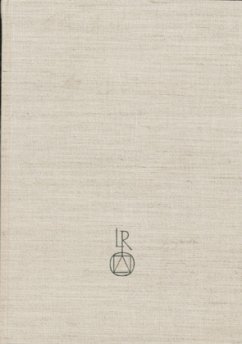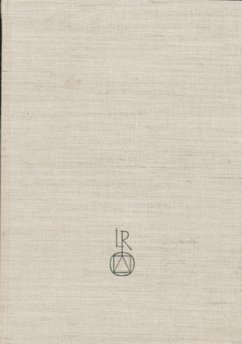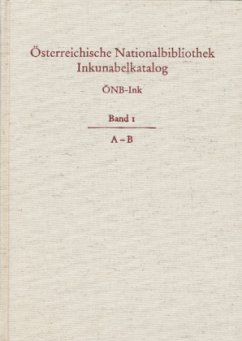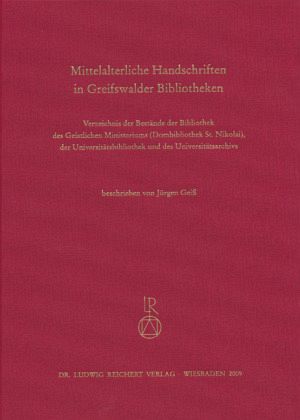
Mittelalterliche Handschriften in Greifswalder Bibliotheken
Verzeichnis der Bestände der Bibliothek des Geistlichen Ministeriums (Dombibliothek St. Nikolai) der Universitätsbibliothek und des Universitätsarchivs
Beschrieben von Jürgen Geiß
Versandkostenfrei!
Versandfertig in 2-4 Wochen
128,00 €
inkl. MwSt.

PAYBACK Punkte
0 °P sammeln!
The catalogue describes 174 manuscripts of the late medieval period (ca. 1250 - end of the 16th centuries), now held by the Church Library Saint Nicolas (Geistliches Ministerium, 104 codices) and the University at Greifswald (University Library, 66 codices; University Archive, 4 codices). The catalogue data had been worked out from Dec. 1, 2001 up to Oct. 31, 2006 in the Centre of Manuscript Research in the States Library Berlin (Staatsbibliothek zu Berlin - Preußischer Kulturbesitz) according to the abbreviated guidelines for descriptions of late medieval manuscripts by the German Research C...
The catalogue describes 174 manuscripts of the late medieval period (ca. 1250 - end of the 16th centuries), now held by the Church Library Saint Nicolas (Geistliches Ministerium, 104 codices) and the University at Greifswald (University Library, 66 codices; University Archive, 4 codices). The catalogue data had been worked out from Dec. 1, 2001 up to Oct. 31, 2006 in the Centre of Manuscript Research in the States Library Berlin (Staatsbibliothek zu Berlin - Preußischer Kulturbesitz) according to the abbreviated guidelines for descriptions of late medieval manuscripts by the German Research Community (Deutsche Forschungsgemeinschaft).
The codices at St. Nicolas' Library predominantly consist of medieval text for the theological and juridical practice of its owners. More than 80 percent of them derive from the contemporary libraries of the black and grey friar communities in the town. Some scattered items come from several clergymen at the Greifswald parish church of St. Mary's, whereas from the two other church libraries of the town (St. Nicolas', St. Jacob) no medieval manuscript has survived. Some of the codices from the cloister and church libraries at Greifswald reflect the dawn of the university founded in 1456, as the contemporary libraries of the faculties of arts, theology, law and medicine are lost without any trace. The most important examples for that are two legacies by two members of the university, an important donation (20 codices) by the lawyer Johannes Meilof to the library of the grey friars (20 codices) and a smaller by the theologian Wichmann Kruse to St. Mary's.
The provenance of the manuscripts from Greifswald University Library and their subjects are much more diversified. Law, theology, medicine, artes, chronicles and devotional texts, vocabularies and litterae humaniores represent the main branches of late medieval literature. Outstanding is an early manuscript of the 'Decretales' written and illuminated around 1250 in Paris, three humanistic codices produced for Johannes Abezier, bishop of Warmia, during the Council at Constance at the beginning of the 15th century, a dozen prayer books in Middle Low German and Dutch languages and four Swedish codices from the 16th century concerning law and historiographical subjects. In most instances these manuscripts do not come from medieval Greifswald, but from the Baltic Sea regions, the Netherlands, the Low Rhine areas and sporadical from Italy and France.
The four medieval codices in the University Archive bequeath the main register and the annals plus the deanery and constitutional registers of the faculty of arts. These items represent the most important sources of Greifswald University history.
The data of the printed catalogue is also accessible via the German manuscript database (www.manuscripta-mediaevalia.de) In addition you will find here digital copies of the manuscripts, approximately one third as complete copies and the rest in selection. A representative choice of 26 images (16 black and white, 10 coloured) is contained in the printed catalogue.
All in all the medieval manuscripts of the Greifswald libraries - especially those from the Church Library of St. Nicolas' - are very important for the cultural history of the Hanse region, as in no other town of this region manuscripts survived in matchable closeness.
The codices at St. Nicolas' Library predominantly consist of medieval text for the theological and juridical practice of its owners. More than 80 percent of them derive from the contemporary libraries of the black and grey friar communities in the town. Some scattered items come from several clergymen at the Greifswald parish church of St. Mary's, whereas from the two other church libraries of the town (St. Nicolas', St. Jacob) no medieval manuscript has survived. Some of the codices from the cloister and church libraries at Greifswald reflect the dawn of the university founded in 1456, as the contemporary libraries of the faculties of arts, theology, law and medicine are lost without any trace. The most important examples for that are two legacies by two members of the university, an important donation (20 codices) by the lawyer Johannes Meilof to the library of the grey friars (20 codices) and a smaller by the theologian Wichmann Kruse to St. Mary's.
The provenance of the manuscripts from Greifswald University Library and their subjects are much more diversified. Law, theology, medicine, artes, chronicles and devotional texts, vocabularies and litterae humaniores represent the main branches of late medieval literature. Outstanding is an early manuscript of the 'Decretales' written and illuminated around 1250 in Paris, three humanistic codices produced for Johannes Abezier, bishop of Warmia, during the Council at Constance at the beginning of the 15th century, a dozen prayer books in Middle Low German and Dutch languages and four Swedish codices from the 16th century concerning law and historiographical subjects. In most instances these manuscripts do not come from medieval Greifswald, but from the Baltic Sea regions, the Netherlands, the Low Rhine areas and sporadical from Italy and France.
The four medieval codices in the University Archive bequeath the main register and the annals plus the deanery and constitutional registers of the faculty of arts. These items represent the most important sources of Greifswald University history.
The data of the printed catalogue is also accessible via the German manuscript database (www.manuscripta-mediaevalia.de) In addition you will find here digital copies of the manuscripts, approximately one third as complete copies and the rest in selection. A representative choice of 26 images (16 black and white, 10 coloured) is contained in the printed catalogue.
All in all the medieval manuscripts of the Greifswald libraries - especially those from the Church Library of St. Nicolas' - are very important for the cultural history of the Hanse region, as in no other town of this region manuscripts survived in matchable closeness.
Dieser Artikel kann nur an eine deutsche Lieferadresse ausgeliefert werden.



